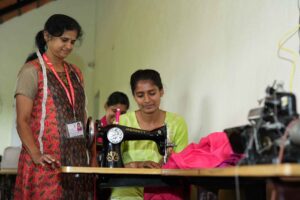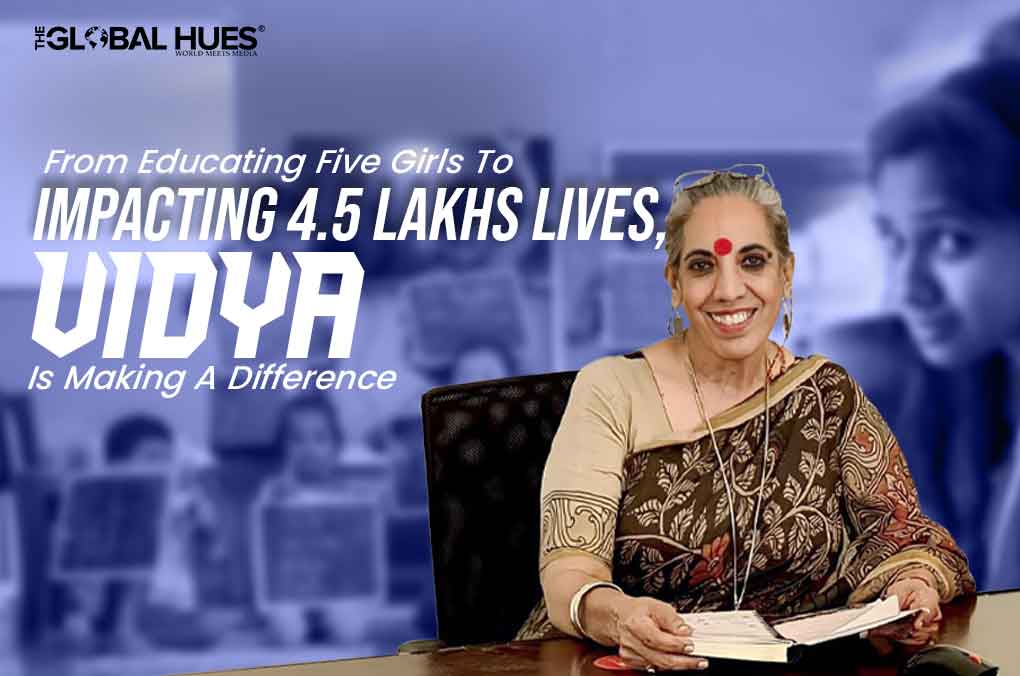What you do can make a difference in people’s lives. That’s what Rashmi Misra did in 1985. When she saw five girls playing in the drain, she understood what she had to do. She decided to educate the girls in her home. What started as an act of kindness has today burgeoned into a movement impacting lakhs of children, youth and women around the country.
Motivated by a desire to make a positive impact on the lives of children, youth and women who come from marginalised communities, she founded NGO VIDYA in 1985.
She believes that education is a powerful tool for social and economic empowerment and that by providing access to education, she can help to break the cycle of poverty that affects many families in India. Let’s hear the story of VIDYA in her own words.
-
What inspired you to find an NGO rather than a business or a school?
I founded NGO VIDYA in 1985 intending to provide education to underprivileged children, youth and women and work with the motto ‘Educate.Empower.Transform’. I started with educating five little girls at my home but we have come quite far in impacting over 4.5 lakh beneficiaries through various education projects across India.
I chose to start an NGO rather than a business or a school because I believed an NGO would allow me to reach a wider audience and achieve a significant impact.
-
What was the most challenging problem you faced in the leadership and management of your NGO?
To achieve our mission, we need to secure funding and support from donors, partners, and stakeholders. Continuous financial stability and sustainability of the projects have always been a challenge but we have been running many programs including our flagship project VIDYA School for 17 years and Bal Vihar School for 30+ years.
We work with stakeholders, including donors, government agencies, community members, and partner organisations. Managing these relationships can be challenging, especially when we have to work without much recognition for our work in government schools.
View this post on Instagram
NGOs are often held to high standards of transparency and accountability, particularly when it comes to using resources and managing finances. We need to be able to provide clear and accurate information to stakeholders and ensure that their organisation meets its legal and ethical obligations. VIDYA has the credibility of being a very transparent organisation and has passed rigorous due diligence processes.
Overall, leadership and management of an NGO require a unique set of skills, including strategic thinking, relationship-building, adaptability, and the ability to navigate complex social and political environments.
-
Elaborate on your most successful program. How is your organisation’s work make a difference?
One of the primary factors that have contributed to the success of VIDYA is its holistic approach to education. Rather than focusing solely on academic subjects, we recognise the importance of addressing the social, emotional, and physical needs of students. Our schools often provide students with access to healthcare, nutritious meals, and extracurricular activities, in addition to traditional academic subjects.
VIDYA operates many schools and educational programs that provide access to quality education for children who might not otherwise have the opportunity to attend school. Many of these programs are specifically designed to serve beneficiaries from underserved backgrounds. VIDYA School is a flagship project which is a K-12 CBSE school and caters to the education of 1000+ students from less privileged backgrounds.

Khushboo, a proud VIDYA School Graduate broke the barriers and became the first woman in her family to become a postgraduate, now working as a Data Analyst at KPMG. An excommunicated widow is now a successful business owner. A dropout youth became a high scorer and a proud graduate. A 9-year-old girl persuaded her abusive, alcoholic father to go into rehab. A girl in our eighth-grade class dreams of going back to her home town and changing it from the ground up. A 10th-standard girl scored a perfect 10.0 CGPA. VIDYA makes stories like this happen. To see our beneficiaries enter the best universities and have women successful as entrepreneurs makes me swell with pride and joy.
We also operate vocational training programs that provide job skills and opportunities for underprivileged women. These programs have not only empowered and improved their economic prospects but also contributed to overall economic development.
Our women’s empowerment programs provide support and resources to women in areas like health, financial management, and leadership development. These programs have helped to increase the social and economic status of women in their communities.
-
What is your best reward for choosing to found your NGO? How far have you come?
While there may be challenges and obstacles along the way, the rewards of founding an NGO can be significant. This includes touching the lives of over 4.5 lakh beneficiaries through 200+ projects across India. We are proud to be a part of the transformation that we bring in an individual and how they take it across to their family, then to the community and transforming the society at large.

VIDYA dreams of seeing an India where every child gets a quality education, every youth has an opportunity to succeed, and every woman achieves economic and social independence.
-
Are you planning to expand and improve the NGO services? If yes, how are you planning to achieve that?
We have come a long way and made a significant contribution to the education and empowerment of underprivileged children and women in India. We have set our vision for 2035 which includes
- VIDYA Centre of Excellence in every metro
- Centres in 40 Indian cities and rural areas
- Partnerships with at least 1000 government schools
- 15 lakh direct and indirect beneficiaries
- VIDYA 2.0, an initiative to scale VIDYA’s best programs digitally across the world
- 100% beneficiary employment rate
- Self-sufficiency through alumni and endowment funds




